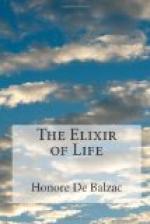At first Don Juan was swayed hither and thither by countless thoughts, and wavered between two decisions. He took counsel with the gold heaped up by his father, and returned in the evening to the chamber of death, his whole soul brimming over with hideous selfishness. He found all his household busy there. “His lordship” was to lie in state to-morrow; all Ferrara would flock to behold the wonderful spectacle; and the servants were busy decking the room and the couch on which the dead man lay. At a sign from Don Juan all his people stopped, dumfounded and trembling.
“Leave me alone here,” he said, and his voice was changed, “and do not return until I leave the room.”
When the footsteps of the old servitor, who was the last to go, echoed but faintly along the paved gallery, Don Juan hastily locked the door, and sure that he was quite alone, “Let us try,” he said to himself.
Bartolommeo’s body was stretched on a long table. The embalmers had laid a sheet over it, to hide from all eyes the dreadful spectacle of a corpse so wasted and shrunken that it seemed like a skeleton, and only the face was uncovered. This mummy-like figure lay in the middle of the room. The limp clinging linen lent itself to the outlines it shrouded—so sharp, bony, and thin. Large violet patches had already begun to spread over the face; the embalmers’ work had not been finished too soon.
Don Juan, strong as he was in his scepticism, felt a tremor as he opened the magic crystal flask. When he stood over that face, he was trembling so violently, that he was actually obliged to wait for a moment. But Don Juan had acquired an early familiarity with evil; his morals had been corrupted by a licentious court, a reflection worthy of the Duke of Urbino crossed his mind, and it was a keen sense of curiosity that goaded him into boldness. The devil himself might have whispered the words that were echoing through his brain, Moisten one of the eyes with the liquid! He took up a linen cloth, moistened it sparingly with the precious fluid, and passed it lightly over the right eyelid of the corpse. The eye unclosed. . . .
“Aha!” said Don Juan. He gripped the flask tightly, as we clutch in dreams the branch from which we hang suspended over a precipice.
For the eye was full of life. It was a young child’s eye set in a death’s head; the light quivered in the depths of its youthful liquid brightness. Shaded by the long dark lashes, it sparkled like the strange lights that travelers see in lonely places in winter nights. The eye seemed as if it would fain dart fire at Don Juan; he saw it thinking, upbraiding, condemning, uttering accusations, threatening doom; it cried aloud, and gnashed upon him. All anguish that shakes human souls was gathered there; supplications the most tender, the wrath of kings, the love in a girl’s heart pleading with the headsman; then, and after all these, the deeply searching glance a man turns on his fellows as he mounts the last step of the scaffold. Life so dilated in this fragment of life that Don Juan shrank back; he walked up and down the room, he dared not meet that gaze, but he saw nothing else. The ceiling and the hangings, the whole room was sown with living points of fire and intelligence. Everywhere those gleaming eyes haunted him.




